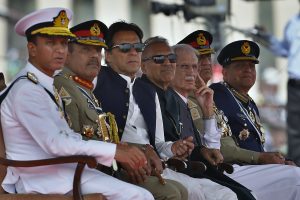In an unexpected turn of events, President Arif Alvi has unilaterally proposed that the Pakistani Election Commission schedule the next general elections for November 6, 2023. This decision, seen as an aggressive move by the president, has the potential to create yet another constitutional and political crisis in the country.
Decisions relating to election dates are solely in the hands of the Election Commission of Pakistan (ECP) after the recent changes to the Election Act. The ECP plays a crucial role in Pakistan in ensuring free and fair elections, and their independence is vital for upholding democratic principles.
In the past two weeks, Alvi has had three meetings with the law minister to discuss the election schedule. Despite being informed that he lacks the authority to decide on issues related to elections, he has continued to hold meetings and issue statements on elections. Earlier, the ECP had declined his request to meet with the chief election commissioner, stating that the electoral body need not discuss the matter with the president.
Alvi’s letter recommending an election date could be disregarded by the ECP since it is deemed unlawful.
The development will impact the political future of the Pakistan Tehreek-e-Insaf (PTI), the party founded and led by former Prime Minister Imran Khan, who is in jail after being convicted for corruption.
In recent months, the PTI has witnessed a significant division within its ranks, primarily due to Khan’s confrontational approach toward state institutions. Several factions have emerged within the PTI, and Alvi is closely affiliated with the Khan faction. Alvi’s discussions about elections have therefore raised concerns over whether his maneuvers are aimed at benefiting Khan’s PTI.
Significantly, a PTI breakaway group known as the Pakistan Tehreek-e-Insaf Parliamentarians (PTI-P) has been silent on the election schedule, indicating that they are prepared to follow the ECP’s deadline for holding elections after the conclusion of the nation’s delimitation process.
Pervez Khattak, a former chief minister of Khyber Pakhtunkhwa and the PTI-P leader, told The Diplomat that Alvi did not seek their input before proposing the election date. He claimed that the president was complicating matters for himself and the party by making unlawful decisions.
“The president is forgetting that he is representing Pakistan and not Imran Khan,” Khattak said.
He claims that the PTI-P group is the actual voice of PTI voters.
PTI factionalism has intensified to the point where Khan’s faction now represents the smallest segment within the party. In Khyber Pakhtunkhwa province, the PTI-P holds considerable influence and poses a formidable challenge to Khan’s faction. Meanwhile in Punjab, PTI leaders, who broke away to establish the Istehkam-e-Pakistan Party (IPP), are seeking to advance the party’s reform agenda.
These events have isolated and undermined Khan’s faction. Since he is in prison and does not have a strong leader active on the ground, Khan’s group faces formidable obstacles.
This might provide other PTI factions with room to thrive electorally by adopting a more conciliatory stance toward state institutions, especially the powerful army.
As general elections draw near, it appears that the PTI-P faction is putting itself in a strong position to win and consolidate power in Khyber Pakhtunkhwa. Khan’s camp will have a difficult time fending off his former colleagues in the PTI who are now claiming equal ownership of the party and competing for votes. Rival PTI groups may be able to establish governments in Punjab and even Khyber Pakhtunkhwa, leaving Khan’s faction adrift.
Pakistan’s security forces have been accused by Khan of seeking to marginalize the PTI because of its criticism of state institutions in the past. Arguably, elections would be more inclusive and the next government will have more credibility if PTI factions are permitted to run for office.
In the current scenario, it remains to be seen whether President Alvi can successfully persuade a significant number of PTI-P leaders who are not in Khan’s faction to back his push for holding early elections.
While it may be tempting for some PTI supporters of Khan to support Alvi’s decision, they need to take into account the political and legal ramifications of his move. Despite being prohibited under the constitution from making election-related decisions, Alvi has adamantly gone ahead to do so. By violating the constitution, Khan’s already weakened faction risks further exclusion and loss of legitimacy. Khan’s faction could sustain further losses, as more members could leave to join other PTI groups.
It appears that the PTI’s splintering may very well put an end to the party’s chances of winning elections as groups outside of Khan’s faction continue to gather support and establish their own agendas.

































